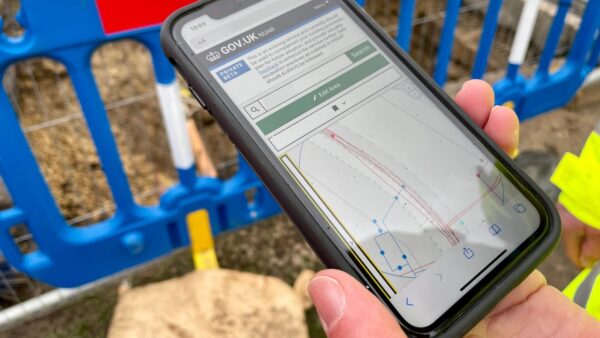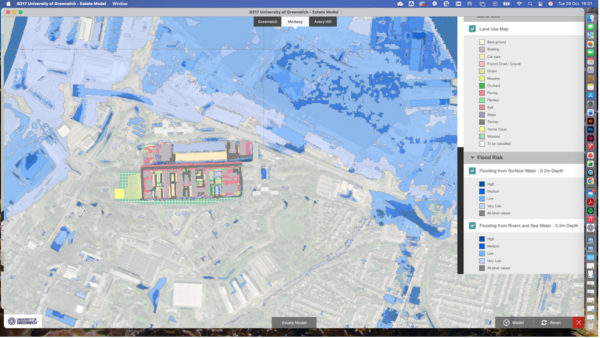
Not only does construction need to adopt a data-driven approach en masse, it should also collaborate around data, says Sir Robert McAlpine‘s Grant Findlay.
The construction industry has historically been reluctant to engage with data and technology, and although there has been notable improvement in the last few years, there is still work to be done refining how innovation can be translated into productivity.
A report from the Royal Institution of Chartered Surveyors suggested that as recently as 2021, 95% of project data was not used at all during and after completion of construction projects. General attitudes to construction analytics have changed considerably in that time – particularly with the rise of AI – but the figure still speaks to a broader issue.
Businesses are assessing how best to exploit AI innovation and the data revolution to improve productivity and output, and the construction industry must start moving in that direction. But AI can only be as valuable as the data it is fed. While its opportunities are manifold, be it generative design or predictive analytics, there needs to be a better understanding of the link between the quality of the data collected and the value of the insights it generates.
Judicious selection of data
Digital Construction Week made clear that conversations in the industry are centred around producing data that is effectively structured, accessible and reliable. The availability of data is not the problem. The challenge now is how best to leverage this for the wider benefit of the industry, and it is becoming more pressing to address it. There are high expectations for the government’s building agenda – be it 1.5 million homes, the 10-year Infrastructure Strategy, or the anticipated catalogue of data centres – with limited reference to market constraints.
What can guide improved outcomes for projects is more effective utilisation of data, as even small-scale data inefficiencies can accumulate to become a significant hindrance to the industry. Without correct implementation and adoption, we may be pursuing the wrong methods to improve construction output. Interpreting data in sophisticated and forward-thinking ways will be key to maximising project efficiency and delivery.
Data collaboration is the key to output
A rising tide lifts all boats – and this mindset can be implemented industry-wide. By sharing and collaborating with data, far greater insights will be yielded. By integrating teams and training personnel throughout all stages of project development, the industry can more effectively streamline and improve productivity.
Take carbon emissions as an example. Contractors are working towards net zero, sustainability and emissions targets, and by using previous project data to create learning legacies, carbon across supply chains can be reduced. Technology or AI-enhanced analytics can then run alongside this, providing indicators of external risk to a project.
It is vital to approach teams and technology pragmatically. It can be all too easy to overlook the importance of having a fully integrated and trained team, and to employ technology for the sake of it. To get the most from data gathered and analysed, organisations should invest in building the data literacy of their teams and establish a core technology toolkit to ensure consistency in application across the business ecosystem.
Shifting attitudes
To facilitate this transition, we need a pivotal shift in attitude. While more than 70% of UK construction projects are already using digital construction, adoption and implementation of data-led technology and frameworks are still fragmented and incremental. The high costs and financial resources necessary to ensure integration and training are a greater issue for SMEs. Such a disparity could be more easily remedied with a shared platform of collaboration, and doing so would enable a more agile construction industry and put the UK more squarely on the international stage.
This is by no means a straightforward challenge, and the collection and analysis of data may pose a formidable task for firms still living with a pre-data mindset. But the benefits and opportunities of establishing data-centric habits and digital analytics as a matter of routine will result in a substantially more successful construction sector.
To streamline the sector, collaboration and shared learning are crucial. Sector-wide initiatives, like the Construction Productivity Taskforce, were established to improve UK construction productivity through data-driven analysis of live projects and to offer a better future by encouraging contractors to define a new way of working with data.
The improvement of technology and data in construction is undeniable, but there remains work to be done. By adopting and leveraging digital innovation sector-wide, and marrying this with effectively organised data, organisations can expedite time and resources, and enable a more cohesive monitoring of their projects in real-time. The time has come for our industry to move further toward a more data-efficient future.
Comments
Comments are closed.
















Great article Grant there is much to do and understanding the quality of that data and how to maximise it is key.